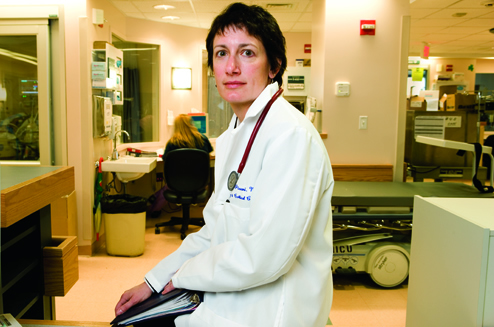Centers of Excellence: Infusing Aging into Clinical Specialties
At Yale University School of Medicine, Mary Tinetti, MD, and her colleagues decided to focus their Hartford Center of Excellence on identifying fellows and junior faculty from the subspecialities of internal medicine who have an interest relevant to aging. "We give them support and integrate them into some of our clinical and teaching activities," says Dr. Tinetti. "We don't expect them to become geriatricians. Instead, the idea is that they will bring a geriatric focus to their specialty," says Dr. Tinetti.
By giving fellows and junior faculty research support, and mentoring them in their research, this strategy has been "spectacularly successful." Hartford Foundation funding is used for work on age-related research within their specialty. For example, an infectious disease fellow is examining diagnostic criteria for urinary tract infections in nursing home residents. A cardiologist who specializes in transplantation is likewise investigating immunologic changes with aging.
"For people who want to do patient-focused research, we provide an outstanding state-of-the-art research infrastructure with help with data collection, data analysis, and research design, which they don't have access to otherwise," says Dr. Tinetti. She reports that the physicians who they've trained have remained focused in geriatrics and many continue to work with the Section of Geriatrics on educational efforts.
Focus on Functional Status of Older ICU Patients
“My pulmonary medicine colleagues and I no longer groan when an older person comes into the intensive care unit because I’ve demonstrated that these patients don’t necessarily do worse, as long as we take care of them properly,” says Margaret Pisani, MD, who is an assistant professor in the Department of Internal Medicine, Section of Pulmonary and Critical Care Medicine, Yale University School of Medicine. Dr. Pisani, who is not herself in the Section of Geriatrics, has been influential in spreading the word about providing optimal care for geriatric patients among her pulmonary medicine colleagues.

Margaret Pisani, MD, Yale University, New Haven, CT at Yale-New Haven Hospital ICU. Dr. Pisani’s research is helping physicians to better understand how to provide care for older patients in the ICU.
What qualifies Dr. Pisani to deliver this message is expertise gained from her research on outcomes in older ICU patients. When she first developed this interest, she wasn’t sure how she would be able to pursue her patient-focused research within the pulmonary section at Yale, a basic science oriented section. At a meeting on fellowship training at Yale, Dr. Pisani spoke up about her interests and serendipitously met Dr. Mary Tinetti.
Because of her Hartford Center grant, Dr. Tinetti was on the lookout for promising fellows and junior faculty from the subspecialities of internal medicine who had interests relevant to aging. “By supporting them through the Hartford Center of Excellence and integrating them into some of our clinical and teaching activities, we hope that they will bring a geriatric focus to their subspecialty,” says Dr. Tinetti. She asked Dr. Pisani to submit a project proposal, and offered to support her through the Hartford Center of Excellence.
The questions Dr. Pisani wanted to answer were this: why can two older people in the ICU with the same critical condition have vastly different outcomes, and how can these patients be managed to maintain an older person’s cognitive and physical functioning through a critical care episode? Her research project during the time she was funded by the Hartford Center of Excellence looked at the impact of dementia on patient outcomes. While this factor proved to have no significant impact, it prompted Dr. Pisani to look further at baseline risk factors as well as modifiable ones, such as medication use.
“The Hartford fellowship was the launching pad for me,” says Dr. Pisani. It provided some money to pay for research support, such as a nurse to help collect data and a statistician to help analyze the data. Subsequently, she received additional funding, including a five-year career development award from the NIH entitled, Impact of Psychoactive Drugs on Delirium in ICU Patients. “I was very fortunate to get the support from the Hartford Foundation, because it would have been easy to completely fail in this endeavor without support.”
Dr. Pisani has not only succeeded in funding her own research, she’s helped to raise awareness among her colleagues about delirium, medication use, and other factors that impact an older ICU patient’s ability to maintain functional status. Her influence has also broadened beyond Yale University. She’s been asked to chair a session at the 2006 Annual Meeting of the American Thoracic Society on care of the geriatric patient in the ICU, and expects to share her research at other professional association meetings, as well.
